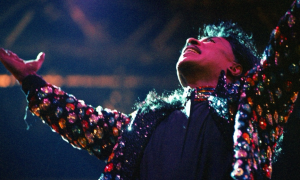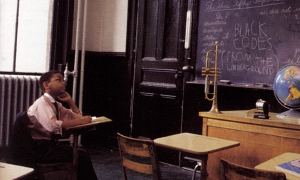Home » Jazz Articles » Opinion » Jazz and Social Protest
Jazz and Social Protest
Perhaps an in depth analysis of this trend (the institutionalization of jazz) would have yielded a sound explanation for what appears to be the diminishing role of this music in social activism.
The timeliness of Lincoln Center's Jazz and Social Protest panel discussion was ominously appropriate, convening the evening following Bush's prime time delivery of his St. Patrick's Day Iraq manifesto. All of the members of the gathered group of educator-speakers - revolutionary writer-poet-performer Amiri Baraka, activist playwright-poet Sonia Sanchez, musician-composer-arranger Cecil Bridgewater, and its moderator, author and professor Robert G. O'Meally, Director of the Center for Jazz Studies at Columbia University - possessed unimpeachable "battlefield" credentials for expounding on the subject, guaranteeing a lively, intelligent discussion. A Village Voice article, “FIRE MUSIC: Lincoln Center thaws its cold war on jazz activism”, which pitted the arguments of Baraka, Archie Shepp, David Murray and Oliver Lake against those of Jazz at Lincoln Center representatives Todd Barkan, Albert Murray and Stanley Crouch, published the previous week, seemed to promise something more raucous or contentious.
However, for the major part of the evening, the event (perhaps inevitably considering both its design and venue) merely adhered to its subtitle's agenda as “A(n) historical consideration of jazz as a component of social protest for activism in the 20th Century”, with the panelists' expositions, the interesting and important tales of veteran jazz warriors, predominantly limited to events of the last century, more reminisces than calls to action. Moderator O'Meally's incisive (but not terse) introduction of the speakers followed by an overview of the topic (featuring video clips of Louis Armstrong singing “Black and Blue” in Africa (before an integrated audience that included the President of Ghana), excerpts of Abbey Lincoln and Max Roach performing “Triptych: Prayer, Protest, Peace” from We Insist! Freedom Now Suite, and an interview with Duke Ellington discussing My People was comprehensive. But considering the background of many of the attendees, this could have been considered "preaching to the choir" and might have been better covered in the program notes in order to leave more time for interaction between the panelists and questions from the audience. Unfortunately there was little of the former and none of the latter.
Sonia Sanchez began the evening telling tales of her father, a high school teacher in the South, who played drums during the summer to support his family. She remembered how one night he risked his life by refusing a drunken white listener's demand that the band dance and play Dixie, illustrating the principle that the act alone of playing jazz was revolutionary during the music's early days. She went on to discuss the power of her revolutionary performances with saxophonist Archie Shepp and concluded her introductory statement with a spontaneously improvised poetic recitation.
Cecil Bridgewater spoke of America's changing role from an exporter of products to that of a consumer whose only major export is war and of his many years of experience with Max Roach, the inspirational organizer of many political actions involving jazz musicians throughout his career; but it was in his discussion of the current state of jazz and education that he was most telling. The trumpeter noted that many of today's jazz players are accomplished musicians who have never performed for the people, having learned their trade not on the bandstand with elder statesmen of the music, but in the university. Perhaps an in depth analysis of this trend (the institutionalization of jazz) would have yielded a sound explanation for what appears to be the diminishing role of this music in social activism.
As one may well have expected, it was Baraka who cut to the heart of the matter, immediately attacking Bush and the "imperialism that has reduced us to a uniform organism." He remembered when "revolution was the main trend in the world, not reactionism," and warned "the most dangerous weapon of mass destruction is bullsh*t," but his statement "The art follows the people and the most progressive artists follow the most progressive people," seemed more a nostalgic lament than a description of the current state of the art of jazz.
As the panel discussion neared its conclusion, Sonia Sanchez raised her voice to ask the audience "Can you say peace?" After several rounds of call and response she asked, "Can you walk?" She concluded the program advising the audience to march against the war in Iraq on the upcoming Saturday. Leaving the Kaplan Penthouse at the end of the evening many of the audience members, mostly veterans of the revolutionary jazz movement of the last century, privately voiced the opinion that the discussion should have started where it ended.
< Previous
Albert Mangelsdorff: A Legend at 75
Comments
Tags
For the Love of Jazz
 All About Jazz has been a pillar of jazz since 1995, championing it as an art form and, more importantly, supporting the musicians who create it. Our enduring commitment has made "AAJ" one of the most culturally important websites of its kind, read by hundreds of thousands of fans, musicians and industry figures every month.
All About Jazz has been a pillar of jazz since 1995, championing it as an art form and, more importantly, supporting the musicians who create it. Our enduring commitment has made "AAJ" one of the most culturally important websites of its kind, read by hundreds of thousands of fans, musicians and industry figures every month.






















